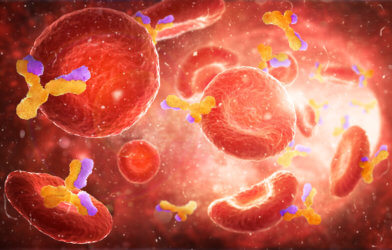When the body’s security system goes haywire, it can lead to a host of problems. For millions of Americans, this malfunction shows up as chronic inflammation in the gut, a condition known as inflammatory bowel disease, or IBD. Living with IBD is a constant battle, with flares of intense pain, diarrhea, and fatigue that can strike without warning. For years, the focus has been on managing these painful symptoms, but now, a groundbreaking new study points to a different approach: preventing the disease from taking hold in the first place.
Published in the prestigious journal Immunity, the research suggests we may have a hidden “switch” inside our own cells that can program our gut to tolerate inflammation. This discovery could open the door to a new era of medicine where, instead of just fighting disease, we can proactively train our bodies to resist it.
Taming the Gut’s “Security Guards”
The key players in this breakthrough are a type of immune cell called a macrophage and a tiny protein known as IL-18. Think of macrophages as the gut’s security guards. Their job is to patrol the intestinal lining, looking for trouble. When they sense a threat, they can either ramp up an inflammatory response to fight it off, or they can adopt a “tolerogenic,” or tolerant, state to keep things calm. In diseases like IBD, these macrophages can become overactive, causing the very inflammation they are supposed to be protecting against.
The study showed that when IL-18 is released in the gut, it acts like a signal, telling macrophages to fundamentally change their “metabolism”—the way they generate energy—from a state of fighting to a state of peace. This isn’t a small change; it’s a profound shift, like a car’s engine switching from burning gasoline for a fast, aggressive drive to an electric battery for a smooth, quiet ride.
The Metabolic Switch and Long-Term Memory
To understand this switch, it helps to know how cells get their energy. Just like we need fuel to move, cells need energy to do their jobs. They get it from two main sources: sugar (a process called glycolysis) and fat (a process called fatty acid oxidation, or FAO). In an active state of inflammation, macrophages prefer to burn sugar. The new study found that IL-18 flips that switch, forcing the macrophages to start burning fat instead. This change doesn’t just alter their fuel source; it also makes them tolerant to inflammation.
“We discovered a metabolic switch that, once turned on, can stabilize an immune-resistant state in intestinal macrophages and, therefore, confer protection against harmful intestinal inflammation,” explained Dr. Roni Nowarski, the senior author of the paper, in a Q&A about the study.
Perhaps the most exciting part of this finding is how this calm state is maintained. The researchers discovered that once this metabolic switch is flipped, it stays on. They call this phenomenon a “bistable circuit,” which means the system can exist in one of two stable states: inflammatory or tolerant. Once it’s pushed into the tolerant state, it takes a lot of effort to push it back. The cells essentially “remember” the IL-18 signal and stay in the peaceful, fat-burning state for weeks, indicating a single, well-timed treatment could have a durable, protective effect.
The Road Ahead for Chronic Inflammation
To prove their theory, the researchers conducted a series of experiments using a group of mice. They found that giving the mice a mild substance that caused temporary inflammation led to a significant increase in IL-18. In a second experiment, giving mice recombinant IL-18 before a strong inflammatory challenge protected them from severe disease. This protection was observed even six weeks later, which confirmed that the IL-18 signal created a long-term “immune memory” in the gut. They also identified a specific protein called SLC12A3 (NCC) that, when activated by IL-18, triggers the chain of events that flips the metabolic switch and creates this long-lasting protective state.
The findings from this study have broad implications for chronic inflammatory disorders beyond IBD. While the research was conducted on mice, it’s possible a similar metabolic switch may be at play in other conditions, such as rheumatoid arthritis. This is why leveraging such a metabolic switch may be most effective when a person is in remission, as the tissue has healed and regained its normal structure.
The research moves us away from simply reacting to inflammation and toward a future where we can proactively program our bodies to resist disease. It shows that by understanding and harnessing the body’s natural processes, we can usher in a new era of medicine focused on prevention and long-lasting health.
Paper Summary
Methodology
The researchers conducted a series of experiments using adult mice on a C57Bl/6J background. They used substances such as dextran sodium sulfate (DSS) to cause inflammation and recombinant IL-18 (rIL-18) to study its effects. The team analyzed the results using various techniques, including single-nucleus ATAC-seq to study gene expression. The sample sizes for the experiments varied, ranging from as few as n=4 to as many as n=34 in some survival studies.
Results
The study found a new innate immune circuit that can program long-term intestinal tolerance. This tolerance is triggered by the protein IL-18, which activates a transporter protein called SLC12A3 (NCC). This action causes a “metabolic switch” in intestinal macrophages, changing their energy source from sugar (glycolysis) to fatty acid oxidation (FAO), which makes them tolerant to inflammation. The researchers also found that this tolerant state is maintained by a “bistable circuit” that encodes a memory of the IL-18 stimulation, allowing the macrophages to stay in a peaceful state for weeks.
Limitations
A key limitation of the study is that it was conducted on mice, so the findings may not directly translate to humans. The paper also notes that the function of IL-18 and other signaling molecules is highly “context-dependent,” meaning their effect can change depending on the state of the inflammation. The researchers also stated that the metabolic switch may be most effective when a person is in a state of remission.
Funding and Disclosures
The authors declare no competing financial interests. The work was supported by grants from the Crohn’s and Colitis Foundation, NIH, and the Kenneth Rainin Foundation. Funding was also provided by the Department of Defense through the National Defense Science & Engineering Graduate (NDSEG) Fellowship Program.
Publication Information
The paper is titled “A metabolic switch orchestrated by IL-18 and the cyclic dinucleotide cGAMP programs intestinal tolerance”. It was published in the journal Immunity on September 10, 2024, in Volume 57, pages 2077–2094. The paper’s DOI is 10.1016/j.immuni.2024.06.001.












